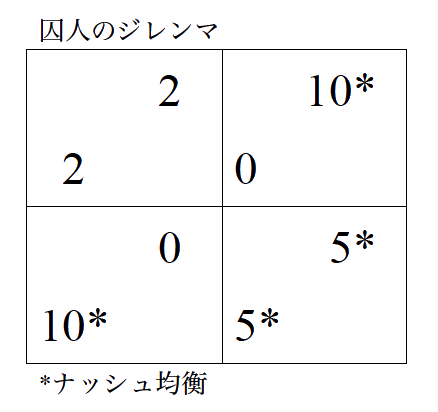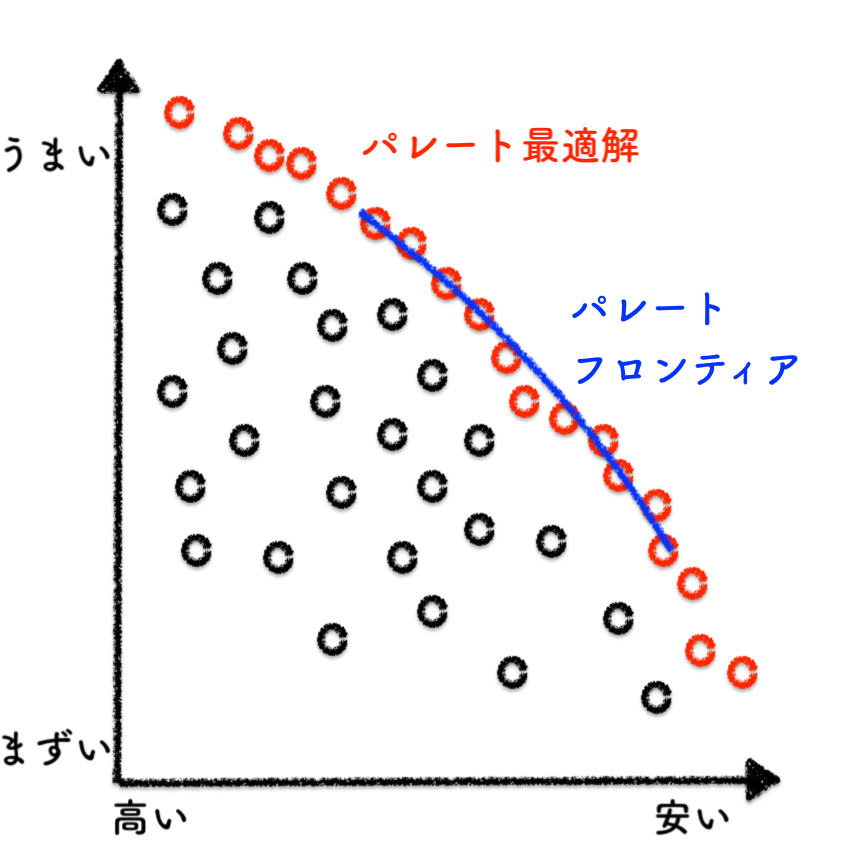Would Jean-Jacques Rousseau feel deeply the Prisoner's Dilemma?
Would Jean-Jacques Rousseau feel deeply the Prisoner's Dilemma?
みなさんの御存知の「囚人のジレンマ」 は次のような情況から始まる。(課題化するためと分かりやすくするために一人称に変更している)。君は、過去に犯罪歴のある若者である。 ある日、友人と歩いていると警官に一緒に逮捕されてしまった。1週間前の商店へ二人組の覆面強盗事件 の嫌疑である。2人とも別々に形式的な取り調べだけを受けたようだ。どうも有益な物的証拠がなく、捜査は難航しているらしい。ただ2人とも事件現場にいな かったというアリバイを証明する人が誰もいない。そこで、初審の担当検事がやってきて、自白の司法取引について君に次のような相談をもちかけた。
(1)このまま被疑者が2人とも黙秘し ていたら、2人とも前科があるので懲役2年が求刑されるだろう。
(2)もし友人が黙秘していても、君が 自白したら、犯罪の事実を明らかにしたわけだから放免してやろう。もちろん友人は懲役10年が求刑され る。
(3)しかし君が黙秘をつづけて、友人 が自白したら、友人は放免、君は懲役10年が求刑されるだろう。
(4)両人が自白したら、その罪にも服 さないとならないから、懲役5年が求刑されるだろう。

[ ]内は利得(gain)である。懲役の年数はマイナス利得の大きさを表現するので、実際の利得は、年数の逆数で表現する方法がある。

囚人のジレンマとは、お互いに仲間どうしで協調して(=黙秘)痛み分けすればよいのに、協調の基礎となる情報が与えられていないために、その ような選択ができず、自分が助かりたい(=利得を得たい)ために検察に協力して友人を裏切る(=自白)ことで、中途半端な懲役5年に服してしまうことをさ す。事前の約束や司法取引の内容に関する情報がないかぎり双方が協調戦略をとることは想像することが困難になり、双方は同じ戦略をとり、君と君の友人は共 に検察の篭絡に見事に引っかかる。犯罪者の集団が「仲間を裏切るな」という掟(=倫理要綱)を採用している——実行されることが稀ゆえに我々はそれをしば しば倫理や道徳と呼ぶ——理由もこれで皆さんにお分かりになるだろう。
囚人のジレンマの利得の収支(payoff)のマトリックスを表現すると次のようになる。

【補足説明】ウィキペディア(囚人のジレンマ、による)
「囚人のジレンマ(しゅうじん のジ レンマ、英: prisoners' dilemma)とは、ゲーム理論におけるゲームの1つ。〈お互い協力する〉方が〈協力しない〉よりもよい結果になることが分かっていても、〈協力しな い〉者が利益を得る状況では互いに協力しなくなる、というジレンマである。各個人が合理的に選択した結果(ナッシュ均衡)が社会全体にとって望ましい結果 (パレート最適)にならないので、社会的ジレンマとも呼ばれる。1950年に数学者のアルバー ト・ タッカーが考案した。ランド研究所のメリル・フラッド(Merrill M. Flood)とメルビン・ドレシャー(Melvin Dresher)の行った実験をもと に、タッカーがゲームの状況を囚人の黙秘や自白にたとえたため、この名がついている。囚人のジレンマではゲームを無期限に繰り返すことで協力の可能性が生 まれる」。ナッ シュ均衡(Nash equilibrium)は、他のプレーヤーの戦略を所与とした場合、どのプ レーヤーも自分の戦略を変更することによってより高い利得を得ることができない戦略の組み 合わせである。ナッ シュ均衡の下では、どのプレーヤーも戦略を変更する誘因を持たない」。
【パ レート最適(Paretian optimum)】(「CO*-DESIGN BOOK #02」より)
パ レート最適とは,ある状況を改善させるためには、他の状況を悪 化させないとならない状態をい う(=トレードオフ関係)。つまり「ある集団が、1つの社会状態(資源配分)を選択するとき、集団内の誰かの効用(満足度)を犠牲にしなければ他の誰かの 効用を高めることができ ない状態を、「パレート効率的(Pareto efficient)」であると表現する。また、誰の効用も犠牲にすることなく、少なくとも一人の効用を高めることができるとき、新しい社会状態は前の社 会状態をパレート改善(Pareto improvement)するという。......(つまり)パレート効率的な社会状態とは、どのような社会状態によっても、それ以上のパレート改善がで きない社会状態のことである(これがつまり「パレート最適(Paretian optimum)」)。- パレート効率性. パ レート最適=「資源配分する際、誰かの効用(満足)を犠牲にしなければ、他の誰かの効用を高めることができない状態」とは、《資源が最大限利用されている 状態》であるので、これもまた(最適)均衡状態であ る。
中 学生にパレート最適を教える例→「テスト前夜にAの科目だけを勉強したらBの科目ではよい点を期待できないでしょう?これがその例」。そして、その解説は 「使える時間が有限である。そのため資源=試験までの時間が最大限利用されている状態である」と説明することができる。あ るいは食べ物では、高級品はそれなりに美味しいが、安くてうまいものがある。また同じ値段でもうまいものからまずいものまで広がっている。美味しいものを たべるためには、ある程度のお金をかけなければならないが、その価格帯でもっとも美味しいものは、お金が最大限利用されているものである。つまり「その価 格帯でもっとも美味しいもの」はパレート最適である。

ウィキペディア日本語「囚人 のジ レンマ」「ナッシュ均衡」
B > A > D > C :このマトリックスの社会哲学的な含意は次のようになる。 A > D 共に協調することは、共に裏切ることよりも利得が大きい。(協調は最大の美徳)
B > A :相手が自分を信頼してくれるのであれば裏切ったほうが利得は大きい。(くり返し使えない)
D > C :相手に裏切られるのであれば、相手を裏切ってもいいだろう。(後味のわるい痛み分け)
このように、ある条件のもとで の、 相互に影響を与える複数のプレイヤーの間の戦略的な相互関係を研究する分野をゲーム理論(Game theory, Theory of Games)という。協 調を含む3つ の組み合わせは、パレート効率的(Pareto efficient)と言い、社会資源の配分を選択するときに、集団内の誰かの効用を犠牲にしなければ、別の誰かを効用を高めない状況があることを示す。 他方(裏 切り、裏切り)の組み合わせは、お互いの相手の戦略(=手の 内、術策)を知っている場合でも、どの参与者も戦略を変えことでもより高い利得が得る 事ができない仕組みをナッシュ均衡(Nash equilibrium)といい、囚人のジレンマがその代表とされる。ランド研究所の研究者たち (M. Flood, M. Dresher, A.W.Tucker)の考案になる、この重要なモデルに私がいつも違和感を感じるのは、思考実験においてもなお、人体実験の材料にされる「囚人」たちの 道徳 的取り扱いである——仮想思考実験における被験者の研究倫理は可能か?そこで、私の小市民的良心が痛 む、 このような用語法を改め、臨床コミュニケーションの研究者らしく、それを「納税者あるいは健康保険料納付者 のジレンマ」と名付けることにし、次のようなルソーの社会契約論上のジレンマに関する課題を考えた。
【課題】医療保険料を支払う人のジレンマ
自分は病気をほとんどしない、でも健康保険料や年金を払っている。結局、年寄りや病人に支払われている。だから自分の保険料は、そのもとを とれないから損をしているのではないかと感じることがある。1人が税金あるいは健康保険料を支払わなくても国家から得る利益はいくらでもあるだろう(でも いつかバレて自分の医療費負担に対して保険料でカバーしてくれなくなってしまうかもしれない)。ただし自分のような考え方のやつばかりだと、国家財政は危 機に瀕するのでこれもまずいだろう(でも、国家財政が未納者で危機に瀕している話は切迫感がない、まだ大丈夫だろう)。(1)こういうふうに考える自分は 間違っているのか?なにが正しい考え方で、何が間違った考え方なのか?(2)自分は保険料を支払うべきか、それともごまかして適当に支払うべきか、そし て、(3)自分の友人が支払わない状況を発見したら、自分はその友人に助言して、支払うよう助言すべきか?
【スペシャルな課題】第(4)番目の課題として、議 論が 出尽くしたら、お考えください。
ジャン=ジャック・ルソー (Jean-Jacques Rousseau, 1712-1778)は『社会契約論』の中で、政府の役割は市民のひとりひとりに自分たちが「自由であることを強制されている」ことを確信させることにあ る、と言ったそうな(岩波文庫3ページ)。医療保険料を支払う人のジレンマに関連づけて——ロバート・アクセルロッド(Robert M. Axelrod,1945-)はそう考えた人の1人——政府の役割がなんで「市民が自由であることを強制されている」ことを自覚させることにあるのか、考 えてください。
[英訳からの引用]
| THE SOCIAL CONTRACT
OR PRINCIPLES OF POLITICAL RIGHT, by Jean Jacques Rousseau,
1762[Translated 1782 by G. D. H. Cole], BOOK I 7. THE SOVEREIGN "In
fact, each individual, as a man, may have a particular will contrary or
dissimilar to the general will which he has as a citizen. His
particular interest may speak to him quite differently from the common
interest: his absolute and naturally independent existence may make him
look upon what he owes to the common cause as a gratuitous
contribution, the loss of which will do less harm to others than the
payment of it is burdensome to himself; and, regarding the moral person
which constitutes the State as a persona ficta, because not a man, he
may wish to enjoy the rights of citizenship without being ready to
fulfil the duties of a subject. The continuance of such an injustice
could not but prove the undoing of the body politic. In order then that
the social compact may not be an empty formula, it tacitly includes the
undertaking, which alone can give force to the rest, that whoever
refuses to obey the general will shall be compelled to do so by the
whole body. This means nothing less than that he will be forced to be
free; for this is the condition which, by giving each citizen to his
country, secures him against all personal dependence. In this lies the
key to the working of the political machine; this alone legitimises
civil undertakings, which, without it, would be absurd, tyrannical, and
liable to the most frightful abuses." |
実
際、各個人は、市民として持つ一般意志とは対立する、あるいは異なる特定の意志を持つ可能性がある。個人の特定の利益は、共通の利益とは全く異なる形で語
りかけてくるかもしれない。個人の絶対的かつ自然に独立した存在は、共通の大義に対して負うべきものを、無償の貢献として捉えるかもしれない。その損失
は、
国家を人格として構成する道徳的存在は、人間ではないため、臣民としての義務を果たす用意がないまま、市民としての権利を享受したいと望むかもしれない。
このような不正義が継続することは、政治体の崩壊を招く以外の何ものでもない。社会契約が空虚な文言とならないように、全体が残りの部分に力を与えること
ができる唯一の事業を暗黙のうちに含める。すなわち、一般意志に従うことを拒む者は、全体によって強制的に従わせるという事業である。これは、彼が自由に
なることを強制されることを意味する。なぜなら、これは、各市民が国に身を捧げることで、あらゆる個人的な依存から身を守ることを保証する条件だからであ
る。これが政治的機構の機能の鍵である。これだけが市民的取り組みを正当化するものであり、これなしでは、それは不合理で、専制的で、最も恐ろしい悪用に
つながる可能性がある。 |
参考:戦略的思考とは何か : エール大学式「ゲーム理論」の発想法 / アビナッシュ・ディキシット,
バリー・ネイルバフ著より;(章立て):ゲーム理論の基本コンセプト
戦略ショート・ショート
交互作用ゲーム
同時進行ゲーム
基本コンセプトの発展
囚人のジレンマ
戦略活用行動
実行の確約
予測不可能性
ゲーム理論の戦略的状況への応用
瀬戸際戦略
協力と協調
投票
交渉
インセンティブ(誘因)
ケース研究
文献その他の情報
クレジット:クレジット:「ジャン=ジャック・ルソーは囚人のジレンマを感じるのか?」(2012年6月 5
日 臨床コミュニケーション@大阪大学)
リンク
文献
その他の情報
Copyleft, CC, Mitzub'ixi Quq Chi'j, 1997-2099